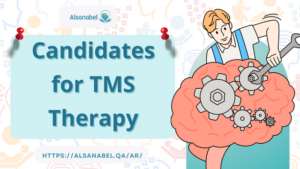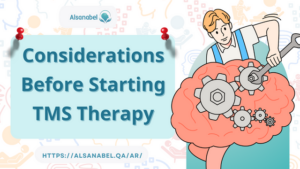Who Can Benefit from TMS Therapy? 2024
- Category TMS Service
Transcranial Magnetic Stimulation (TMS) has emerged as a promising therapy for various conditions, with FDA approval for treating major depressive disorder, obsessive-compulsive disorder, migraines, and more. Understanding who can benefit from this innovative treatment can shed light on its potential impact on mental health and overall quality of life. Join us as we explore the potential benefits of TMS therapy for individuals seeking effective solutions for mental health challenges.
Table of Contents
ToggleCandidates for TMS Therapy
Transcranial Magnetic Stimulation therapy is a non-invasive treatment option that can benefit individuals experiencing various mental health conditions and neurological disorders. Here are some specific groups of individuals who may be candidates:

- Treatment-Resistant Depression (TRD): Individuals diagnosed with major depressive disorder (MDD) who have not achieved symptom relief with multiple trials of antidepressant medications are often considered candidates for TMS therapy. TRD refers to depression that persists despite adequate treatment with two or more antidepressants from different classes at therapeutic doses and durations.
- Anxiety Disorders: While TMS treatment is primarily indicated for depression, there is growing evidence to suggest its potential efficacy in the treatment of certain anxiety disorders, including generalized anxiety disorder (GAD), panic disorder, and post-traumatic stress disorder (PTSD). Individuals with treatment-resistant anxiety symptoms or those who cannot tolerate standard treatments may benefit from TMS therapy.
- Obsessive-Compulsive Disorder (OCD): TMS therapy, particularly deep TMS, has shown promise as a treatment option for individuals with obsessive-compulsive disorder (OCD) who have not responded adequately to medications or psychotherapy. dTMS targets deeper brain structures implicated in OCD, offering a novel approach to symptom management.
- Bipolar Disorder: TMS therapy may be considered as an adjunctive treatment for individuals with bipolar disorder who experience depressive episodes that do not respond to mood stabilizers or other medications. While TMS sessions is not a first-line treatment for bipolar disorder, it may be beneficial in certain cases, particularly for managing depressive symptoms.
- Chronic Pain Conditions: TMS therapy, particularly repetitive TMS , has been investigated as a potential treatment for chronic pain conditions such as fibromyalgia, neuropathic pain, and migraine headaches. Individuals who experience chronic pain that is refractory to conventional pain management strategies may benefit from TMS as an adjunctive therapy.
- Neurological Disorders: TMS has also been explored as a treatment option for certain neurological disorders, including Parkinson’s disease, stroke rehabilitation, and traumatic brain injury (TBI). While more research is needed in this area, TMS shows promise as a non-invasive modality for improving motor function and cognitive outcomes in these populations.
Potential Benefits of TMS Therapy
While individual responses to TMS may vary, many patients experience improvements in their symptoms and overall quality of life. Some potential benefits of TMS Service include:
- Effective Treatment for Treatment-Resistant Depression (TRD): TMS therapy has been FDA-approved for the treatment of major depressive disorder (MDD) in individuals who have not responded adequately to antidepressant medications. Clinical studies have shown that TMS can produce significant improvements in depressive symptoms, including mood, energy levels, and overall functioning.
- Non-Invasive and Well-Tolerated: Unlike electroconvulsive therapy (ECT) or invasive brain stimulation procedures, TMS therapy is non-invasive and does not require anesthesia or sedation. The procedure is generally well-tolerated by most patients, with minimal discomfort and few side effects.
- Localized and Targeted Stimulation: TMS delivers magnetic pulses to specific regions of the brain implicated in mood regulation, cognition, and other functions. This targeted stimulation allows for precise modulation of neural activity, leading to therapeutic effects without affecting surrounding brain tissue.
- Minimal Systemic Side Effects: Unlike medications, which may cause systemic side effects such as weight gain, sexual dysfunction, or gastrointestinal disturbances, TMS therapy primarily affects the brain and does not produce widespread physiological effects. Common side effects of TMS, such as mild headache or scalp discomfort, are generally transient and resolve after the session.
- Adjunctive or Alternative Treatment Option: TMS therapy can be used as a standalone treatment or as an adjunctive therapy to medications and psychotherapy. For individuals who have not responded to conventional treatments or who experience intolerable side effects from medications, TMS offers a viable alternative with fewer systemic effects.
- Improvement in Cognitive Functioning: Some patients undergoing TMS treatment report improvements in cognitive functioning, including attention, memory, and executive function. These cognitive enhancements may be particularly beneficial for individuals with depression or other psychiatric disorders that affect cognitive performance.
- Long-Lasting Effects: Many patients experience sustained improvements in mood and functioning following a course of TMS therapy. While individual response rates may vary, some individuals achieve remission of depressive symptoms or experience prolonged periods of symptom relief without the need for ongoing treatment.
- Safe and Well-Researched Treatment Option: TMS therapy has been extensively researched and has demonstrated safety and efficacy in numerous clinical trials and real-world settings. The procedure is performed in outpatient settings under the supervision of trained healthcare professionals, making it accessible to a wide range of patients.
Considerations Before Starting TMS Therapy
Before starting TMS treatment, it’s essential to consider several factors to ensure that it is the right treatment option for you. Here are some key considerations:

- Diagnosis and Treatment History: Discuss your diagnosis and treatment history with your healthcare provider to determine whether TMS therapy is appropriate for your condition. TMS is typically recommended for individuals who have not responded to standard treatments such as antidepressant medications or psychotherapy.
- Health Status: Inform your healthcare provider about any medical conditions you have and any medications you are currently taking. Certain medical conditions, such as epilepsy or a history of seizures, may impact your eligibility for TMS therapy. Additionally, some medications may need to be adjusted or discontinued before starting TMS.
- Treatment Goals: Clarify your treatment goals and expectations with your healthcare provider. Discuss what you hope to achieve with TMS therapy, whether it’s symptom relief, improved functioning, or enhanced quality of life. Your healthcare provider can help you set realistic expectations based on the available evidence and your individual circumstances.
- Treatment Plan: Review the proposed treatment plan with your healthcare provider, including the number of sessions, frequency of treatments, and expected duration of the treatment course. Understand the logistics of the treatment, such as scheduling appointments, transportation, and potential disruptions to your daily routine.
- Potential Side Effects: Educate yourself about the potential side effects of TMS sessions, including common side effects such as scalp discomfort, headache, or mild muscle twitching. While these side effects are generally mild and transient, it’s essential to be aware of them before starting treatment.
- Financial Considerations: Inquire about the cost of TMS therapy and whether it is covered by your health insurance plan. Some insurance companies may cover TMS therapy for certain diagnoses, while others may require prior authorization or impose limitations on coverage. Understand your financial responsibilities, including copayments, deductibles, and out-of-pocket expenses.
- Alternative Treatment Options: Explore alternative treatment options for your condition and discuss them with your healthcare provider. While TMS therapy may be suitable for many individuals, it’s essential to consider other treatments such as medication adjustments, psychotherapy, or alternative therapies before making a decision.
- Provider Experience and Qualifications: Choose a reputable healthcare provider or TMS clinic with experience and expertise in administering TMS therapy. Inquire about the qualifications of the treatment team, including the TMS technician and supervising physician, and ask about their experience treating patients with similar conditions.
Thank you for taking the time to learn about TMS therapy and who can benefit from it. I hope this information has been helpful to you or someone you know who may be considering this treatment. If you have any questions or would like to share your own experiences with TMS therapy, please feel free to leave a comment below. Your feedback is always appreciated!









